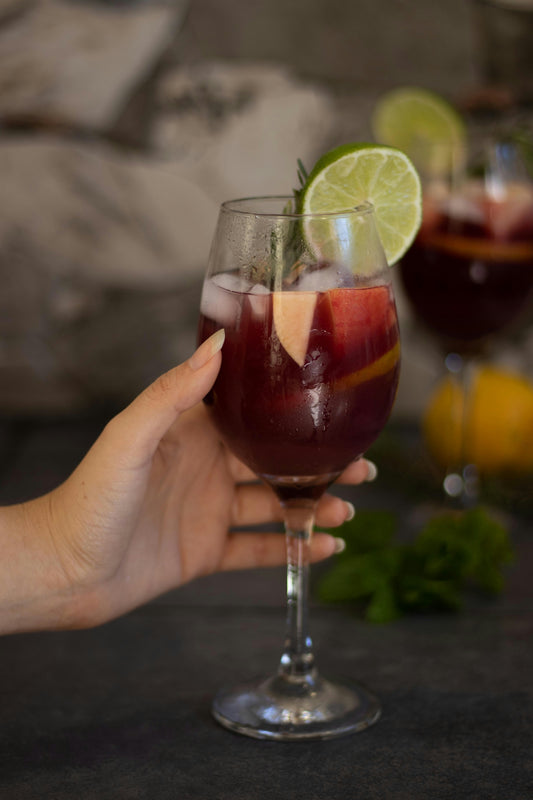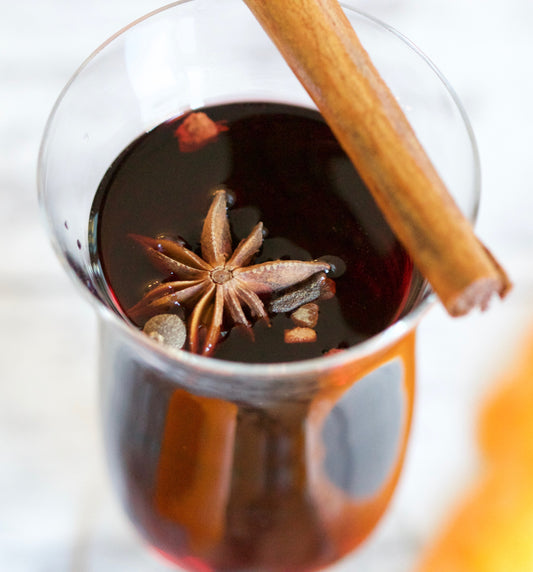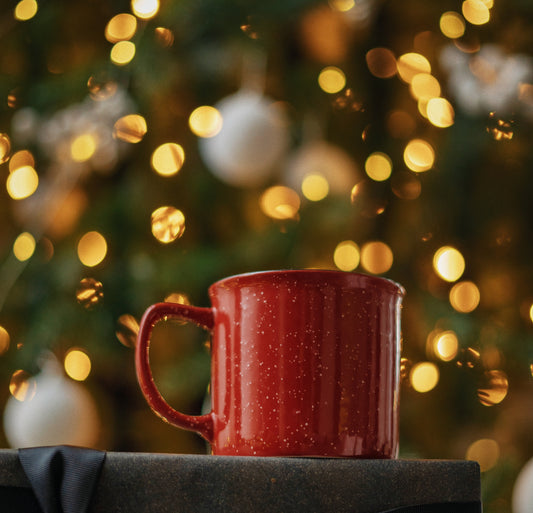TLDR:
Gluhwein (pronounced glue — vine), mulled wine, mulled spiced wine, or Glogg are all variations on the same beverage — heated wine seasoned with sweet and aromatic spices. These spices include, to name a few, cinnamon, cloves, nutmeg, orange, and allspice.
There are many recipes for Glühwein, but the traditional Glühwein recipe calls for heating wine with sugar and spices. Wine is simmered with cinnamon sticks, cloves, citrus peel, cardamom pods and sugar. The addition of these warming spices makes Glühwein the perfect drink for chilly winter evenings.
While Glühwein is typically made with red wine, white wine or rosé can also be used. For a non-alcoholic Glühwein, try using apple cider or apple juice as your base. Some recipes also call for adding brandy or rum to the Glühwein.
My personal favorite is a shot of butterscotch schnapps. The flavor complements sweet red wine and doesn’t get me hammered and laying on the floor drunk listening to Frank Sinatra in an hour. I buy an extra hour of sobriety.
Whether you’re making Glühwein from scratch using one of the recipes provided here or using a Glühwein mix, the key to great Glühwein is letting the Glühwein simmer long enough to let the flavors meld.
Glühwein is not a complicated drink to make. But, traditional Glühwein is challenging to perfect. Today you don’t have to go to Germany to enjoy the glow of a cup of Gluhwein. You can make your own using the curated Sam’s Glow cocktail kit, or track down the supplies on your own.
The special Sam’s seasoning in our glow kit isn’t for sale anywhere else and took years of diligent research amongst wooden stands and blackened kettles through places like Austria, Germany, Finland and Sweden.
Find recipes here:
What is Gluhwein?
Gluhwein (pronounced glue — vine) is a spiced, hot wine that is perfect for warming up on a cold winter’s day. The wine is heated slow, typically on the stove, but also over an open fire if you want to hearken back to the original days of making Glühwein.
The word Glühwein is a combination of glühen, which means “to glow,” and wein, which means “wine.” And that’s exactly what Glühwein does to you after a few cups. It glows in your cheeks and warms you from the inside out. Another theory on the name, is that it originated from the fires that glowed in the dark, cold nights when Glühwein first appeared in kettles over open fires.
Glühwein, mulled wine, mulled spiced wine, or Glogg are all variations on the same theme — heated wine seasoned with sweet and aromatic spices. There are many recipes for Glühwein, but the traditional Glühwein recipe calls for heating wine with sugar and spices. Wine is simmered with cinnamon sticks, cloves, citrus peel, cardamom pods and sugar. The addition of these warming spices makes Glühwein the perfect drink for chilly winter evenings.
While Glühwein is typically made with red wine, white wine or rosé can also be used. For a non-alcoholic Glühwein, try using apple cider or apple juice as your base. Some recipes also call for adding brandy or rum to the Glühwein.
My personal favorite is a shot of butterscotch schnapps. The flavor complements sweet red wine and doesn’t get me hammered and laying on the floor drunk listening to Frank Sinatra within an hour of consumption.
Whether you’re making Glühwein from scratch using one of the recipes on Sam’s Booze or using a Glühwein mix like Sam’s Glow, the key to great Glühwein is letting the Glühwein simmer long enough to let the flavors meld. Just ensure that when heating Glühwein you don’t let the wine boil, or it will change the flavor and alcohol content.
Good Gluhwein includes the right mix of ingredients. The best Glühwein recipes live in the heads of those stirring steaming wine in blackened pots at Christmas Markets throughout Europe. That’s why I went to those markets and did the thankless research of stumbling my way through wooden stalls and drinking at Apres Ski parties to bring you the recipes you can’t find anywhere else.
Here are some complete recipes for traditional Bavarian Glühwein and Wassail.
The infusion of sweet and aromatic ingredients like oranges, cinnamon, alcoves overpower the wine flavor. Go with a sweet juicy wine, a light or medium bodied wine. Not something dry and full bodied.
This is less about terroir and more about experiencing a comforting, warm glass of spiced wine that hugs your tongue and plants little kisses down your throat and into your belly on a cold night. It’s the glow you’re after, the warmth in your soul that bakes out a core memory of time with family, loved ones, or friends.
We’ve got the luxury of progress to adapt the meaning of Glühwein. But, I believe the origin story of Glühwein saw a different use all together, one of survival not love.
History of Glühwein
Gluhwein originated in Germany as a story of survival and reprisal from a hard life, a life we can’t imagine. In truth, the hot mulled spiced beverage existed centuries before making its way to Germany. But, since traditional Glühwein is synonymous with Germany that’s the history we’ll explore.
Gluhwein first noted appearance in Germany wasn’t until the early 1400s, long after the pillage and death of Julius Caesar. Still, I have to imagine it existed before documentation. Either way, during the 14th and 15th century, the demographic profile still varied from many other European countries.
Created on nights when the heat of day escaped into the open, cloudless sky and cold set in with a harshness that numbed fingers, toes, and faces, I imagine they heated wine over fires and seasoned it for taste.
Gluhwein first noted appearance wasn’t until the early 1400s. But, I have to imagine it existed before documentation, and the first recorded mention of Glühwein anywhere in the world was from centuries before that point.
During the 14th and 15th center in Germany, it’s estimated a little over 10% of the population lived in cities or towns at that time, with the majority still living and working farms. Germany’s economy was agricultural in nature, as opposed to trade and industry. The Germanic people was spread out across large swaths of farmland throughout the country.
Their foray into heating and drinking hot, spiced wine more than likely came about out of necessity to stay warm against the bitter cold winters versus as a social exercise. The cold and poverty of many who farmed and now found themselves restricted in movement and bound as serfs by the nobles of the time to land they originally owned would drive anyone to drink.
Today Gluhwein, or mulled spiced wine is a memory. The heated, spiced wine is synonymous with the Christmas season, a time of love, friends, happiness, and joy. A good cup of christkindl (Christmas) Glühwein transports you into that world. Glühwein ascended in popularity through Christkindlmarkt, Christmas Markets, in Germany, places filled with holiday cheer and goodness.
Not much is known about the first Christkindlmarkts, or Christmas markets. We do know that they served as a place for farmers to sell their goods, and for people to come together and celebrate the holiday season. Over time, these markets became more and more popular, eventually becoming the staple of German Christmas culture that we know today.
With its rich history and unique traditions, it’s no wonder that the Christkindlmarkt has become a global phenomenon. Cities big and small in Germany take their town squares hostages for several weeks leading up to and through the holiday season in this seasonal farmers market.
Just like cities large and small in the United States have farmer’s markets, so, too, do Christmas Markets pop up throughout the entire country of Germany and Europe. At any of these markets you can find a local, with a recipe probably passed down for generations, stirring a pot blackened by open flames, and filled with Glühwein.
At these markets, you can purchase everything from handmade decorations to fresh foods and Glühwein. Some of the more popular Christkindlmarkts are in the bigger cities of Germany, including Nuremberg, Munich, Heidelberg, Dresden, Berlin, Frankfurt, and more.
So if you find yourself in Germany during the holidays, be sure to check one out! And if not, don’t worry — you can always find a Christmas market near you. Just keep an eye out for the telltale signs: twinkling lights, the smell of fresh gingerbread, and the sound of holiday cheer.
Best Wine for Gluhwein
Use Franzia. Or a similar sweet, boxed red wine.
No joke. Slap that bag. The best wine for Gluhwein is a sweet, cheap red wine.
You’re going to season the wine heavily with aromatic and sweet spices that overpower the wine’s original flavor. No need to get fancy and show off your sommelier wine picking skills here.
Go cheap and bountiful, because the final product is going to be a very drinkable, dare I saw chuggable, flavorful beverage.
The best wine for Glühwein is a sweet medium bodied red wine. I like to avoid full bodied, dry red wines. If you can’t stomach Franzia or the like, here is a list of other good varietals to try:
Dornfelder
Malbec
Garnacha
Lambrusco
Zinfandel
Shiraz
Any Blended Sweet Red
Port
FAQs
Is Glühwein the same as mulled wine?
Yes, Glühwein means “Glow Wine” in German. Call it Glühwein, mulled wine, or Glogg. You’re speaking the same language.
Can you get drunk on Glühwein?
Oh yes. It might taste like heated fruit punch but it’s made with wine, which means it has alcohol. The heating occurs below the boiling point so that none of that precious alcohol is evaporated. Oh course, non alcoholic versions to exist too. That’s called Kinder punch in Germany, or kid punch.
What is Glühwein in English?
The word Glühwein is a combination of glühen, which means “to glow,” and wein, which means “wine.” And that’s exactly what Glühwein does to you after a few cups. It glows in your cheeks and warms you from the inside out.
Is Glühwein from Germany?
Glühwein is from Germany. Glogg is from Scandinavia. Mulled Wine is a loose English translation. But, they are all the same, with slight variations.
Glühwein Recipes
Glühwein is traditionally made with cinnamon sticks, cloves, citrus peel, cardamom pods and sugar. The addition of these warming spices makes Glühwein the perfect drink for chilly winter evenings. Below are several variations on Glühwein.




